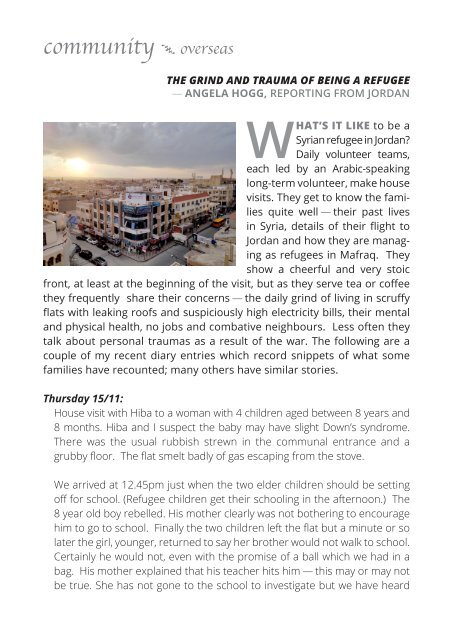Create successful ePaper yourself
Turn your PDF publications into a flip-book with our unique Google optimized e-Paper software.
community overseas<br />
THE GRIND AND TRAUMA OF BEING A REFUGEE<br />
— ANGELA HOGG, REPORTING FROM JORDAN<br />
WHAT’S IT LIKE to be a<br />
Syrian refugee in Jordan?<br />
Daily volunteer teams,<br />
each led by an Arabic-speaking<br />
long-term volunteer, make house<br />
visits. They get to know the families<br />
quite well — their past lives<br />
in Syria, details of their flight to<br />
Jordan and how they are managing<br />
as refugees in Mafraq. They<br />
show a cheerful and very stoic<br />
front, at least at the beginning of the visit, but as they serve tea or coffee<br />
they frequently share their concerns — the daily grind of living in scruffy<br />
flats with leaking roofs and suspiciously high electricity bills, their mental<br />
and physical health, no jobs and combative neighbours. Less often they<br />
talk about personal traumas as a result of the war. The following are a<br />
couple of my recent diary entries which record snippets of what some<br />
families have recounted; many others have similar stories.<br />
Thursday 15/11:<br />
House visit with Hiba to a woman with 4 children aged between 8 years and<br />
8 months. Hiba and I suspect the baby may have slight Down’s syndrome.<br />
There was the usual rubbish strewn in the communal entrance and a<br />
grubby floor. The flat smelt badly of gas escaping from the stove.<br />
We arrived at 12.45pm just when the two elder children should be setting<br />
off for school. (Refugee children get their schooling in the afternoon.) The<br />
8 year old boy rebelled. His mother clearly was not bothering to encourage<br />
him to go to school. Finally the two children left the flat but a minute or so<br />
later the girl, younger, returned to say her brother would not walk to school.<br />
Certainly he would not, even with the promise of a ball which we had in a<br />
bag. His mother explained that his teacher hits him — this may or may not<br />
be true. She has not gone to the school to investigate but we have heard<br />
complaints from many refugee parents that their children get beaten up on<br />
the way to school, or in school.<br />
On the story of their coming to Syria, the mother described how she could<br />
no longer bear the bombarding in Syria. She persuaded her husband they<br />
had to flee. They left, dodging from taxi to taxi and bus to bus, steadily moving<br />
southwards to the Syrian border and then walking across to the Jordan<br />
border with their first two children (the others were born, later, in Jordan).<br />
They carried small bags. Living here in Jordan, she says the housing is<br />
awful and the rents high but the worst thing is the lack of a wider-thanfamily-social-network<br />
to advise and help one when in trouble.<br />
Saturday 17/11*<br />
Arabic lesson — at the end, the teacher Amal* (not her real name), a 25 yearold<br />
female pharmacy student on a scholarship (paid for by someone from<br />
Emirates), asked me how to get into the UK as a refugee.<br />
Amal’s family — parents, three brothers and herself— were offered asylum<br />
in the USA by UNHCR* in 2014 but after a family discussion, they turned it<br />
down as she and her brother had full study scholarships. These would be<br />
cancelled if they immigrated to the USA. While making the decision, the family<br />
knew their application for an overseas move would be cancelled forever. Do<br />
they regret it? I dared not ask. Father (68) can never return to Syria. Long<br />
before the war in Syria he was imprisoned for 15 years for no reason except<br />
false testimony by his wife’s relatives. In prison he was known by a number<br />
and was therefore untraceable. He was given up for dead by his family, and<br />
in the meantime his parents had died. His wife left him. At the change of<br />
regime he was released and offered derisory financial compensation which<br />
he refused. He remarried and had the four existing children.<br />
They live in a grim flat surrounded by building sites on two sides. My<br />
teacher, the budding PhD pharmacist who earns money in her spare time<br />
by teaching Arabic, is unlikely to get a job as a pharmacist here as the jobs<br />
are reserved for Jordanians. The same applies to her scholarship brother<br />
who is a civil engineer. Jordan has thousands of its own. The father with<br />
heart trouble since his imprisonment is too ill to work but can never return<br />
to Syria for fear of further arbitrary imprisonment. They are trapped. (21/11<br />
Today I dropped by and drank coffee with Amal’s mother. She is desperate


















